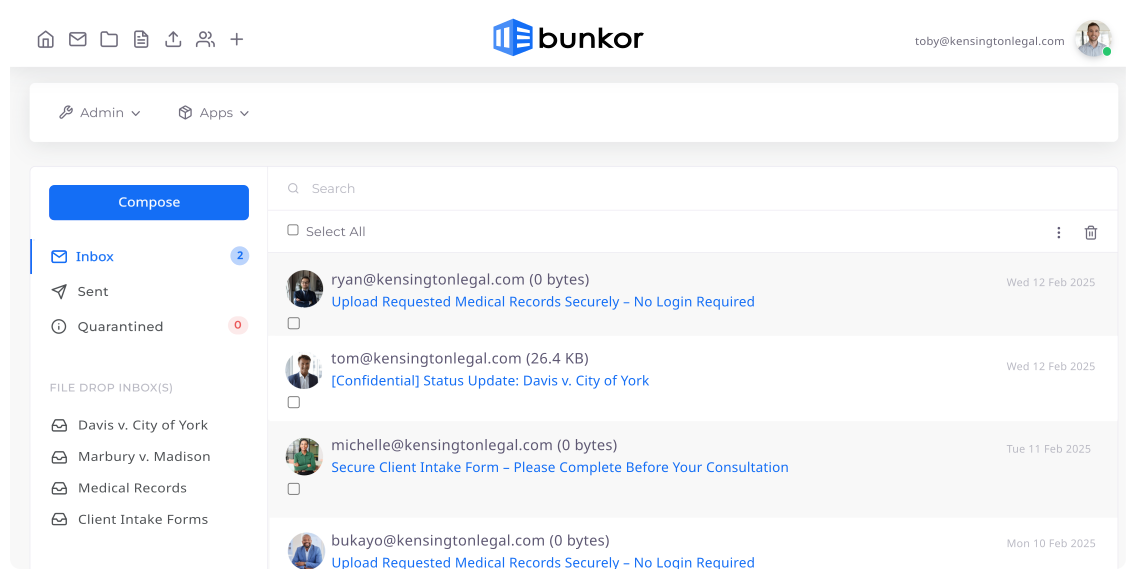Discover unparalleled HIPAA compliant collaboration tools.
Tired of juggling separate tools for encrypted email, file transfers, and secure storage? Bunkor combines them on one platform to save you time and worry.

Privacy-first • Encrypted by default • Built for regulated industries
Security & Compliance
















One Platform. Total Security.
Why juggle four tools when one does it all?
Bunkor replaces the patchwork of email encryption apps, file storage platforms, transfer tools, and secure document systems—by combining all four into one powerful, encrypted solution.
✅ Encrypted Email ✅ Secure File Storage
✅ Safe File Transfers ✅ Protected Documents
Built for businesses that demand simplicity without compromising on security.
🔐 Military-grade encryption. 🤝 Zero-trust architecture. 🔗Seamless collaboration.
AI is changing how data is handled — often without your consent
Many “default” tools scan and index content to power AI features. That can create real risk for professionals handling confidential client data.
- Client confidentiality risk
- Compliance exposure
- Loss of trust and control
Most tools optimize for AI. Bunkor optimizes for human control.

Encrypted File Storage - Vault
Store sensitive documents with end-to-end AES-256 encryption, ensuring your files remain fully protected at rest—accessible only to authorized users, not even us. Every data interaction is automatically logged, providing a full audit trail essential for compliance with regulations like GDPR and HIPAA.
Learn More
Encrypted File Previews
Preview encrypted files directly in the application without downloading—so you can review sensitive content securely, faster, and with full compliance.
Encrypted Email
Collaborate with confidence, standard email is not secure - our encrypted collaboration technology secures your business communications.
Learn More

Encrypted File Drop
Receive sensitive files securely through AES-256 encrypted file drop pages—no login or technical know-how required for your or your clients. Each page is fully customizable with your company’s branding, offering clients a seamless and professional experience while ensuring end-to-end encryption and compliance
Learn More
Encrypted Documents
Create and store sensitive documents directly within Bunkor, protected with AES-256 encryption and backed by a full audit trail—so your confidential drafts never leave the secure environment.
What makes Bunkor different
Bunkor is designed for effortless integration with your existing workflows, offering an intuitive interface that requires minimal training. Our platform ensures that robust security measures do not come at the expense of usability.

End-to-End Encryption

Regulatory Compliance

Zero Trust Architecture

Cloud-Native & Scalable

Easy to Use

AI-safe by design

Full visibility
(audit trails)

White Labelling
How it works
Discover How Fintech Industry Leaders Leverage Our Expertise to Scale, and Deliver Seamless Digital Financial Experiences




Built for professionals who handle confidential information
If client privacy is part of your reputation, Bunkor is built for you.
- Private healthcare clinics
- Law firms & paralegals
- Accounting & bookkeeping
- Financial advisors
- Consultants & agencies
- Independent professionals

Try Bunkor free
We believe trust is earned. We provide a free forever account that lets you try Bunkor for yourself to see it is a fit. We hope that in exchange you can provide feedback that helps us make it better.
- Get access — Create your free account
- Try the app — Upload and organize sensitive files securely on our zero-trust platform
- Share feedback — Tell us what’s missing, confusing, or valuable
Frequently Asked Questions
Have questions? We've got answers to help you get started with Bunkor.
Yes. Bunkor is fully designed to help businesses comply with GDPR, HIPAA, and other data protection laws. It offers features like encrypted file storage, secure communication, full audit trails, and zero-trust architecture that support regulatory compliance.
All data is encrypted using AES-256-bit encryption—one of the strongest encryption standards available. With double-blind encryption and zero-knowledge architecture, not even Bunkor can access your files or messages. Additionally, your data is double encrypted - first on the Bunkor application and again on the Google Cloud Infrastructure.
Very easy. Bunkor was built for users of all technical levels. File drop pages, encrypted messaging, and secure sharing are intuitive and don’t require any special software or training.
Because of our zero-knowledge policy, only you have access to your data. We highly recommend using multi-factor authentication and secure key backup processes.
Bunkor is purpose-built for secure business communication. Unlike general-purpose platforms, it combines encrypted file storage, secure messaging, compliance support, and detailed audit logging—all under one roof.
For Individual plans, there is only one user, and there is no limit to the number of files as long as it's under the storage quota.
For SMB plans:
The Team plan has up to 200 users and 100 GB storage
The Enterprise plan has unlimited users and unlimited storage.
Choose the plan that works best for your needs. Bunkor is fully scalable thanks to Google Cloud Infrastructure, so you can grow from an individual, to a small team, and to enterprise scale without changing providers or upgrading to a new system.
It depends on your plan:
For Individual Professionals
Free plan max file size is 50 MB
Basic plan max file size is 1 GB
Pro plan max file size is 20 GB
For SMB's
Team plan max file size is 20 GB
Enterprise plan max file size is 20 GB
Absolutely. You can white label and have a custom domain with the Enterprise plan
No. Bunkor is entirely cloud-based and works from any modern web browser—no downloads, no plugins, and no setup headaches.
Yes. We offer a free account so you can explore Bunkor's features, test it with your team, and see the benefits before fully committing. Claim Your Free Account Here.
Protect Your Business Today
With the average cost of a data breach reaching $4.24 million, investing in a reliable cybersecurity solution is not just prudent—it's essential. Bunkor empowers your business with the tools needed to protect one of its most valuable assets: its data.





